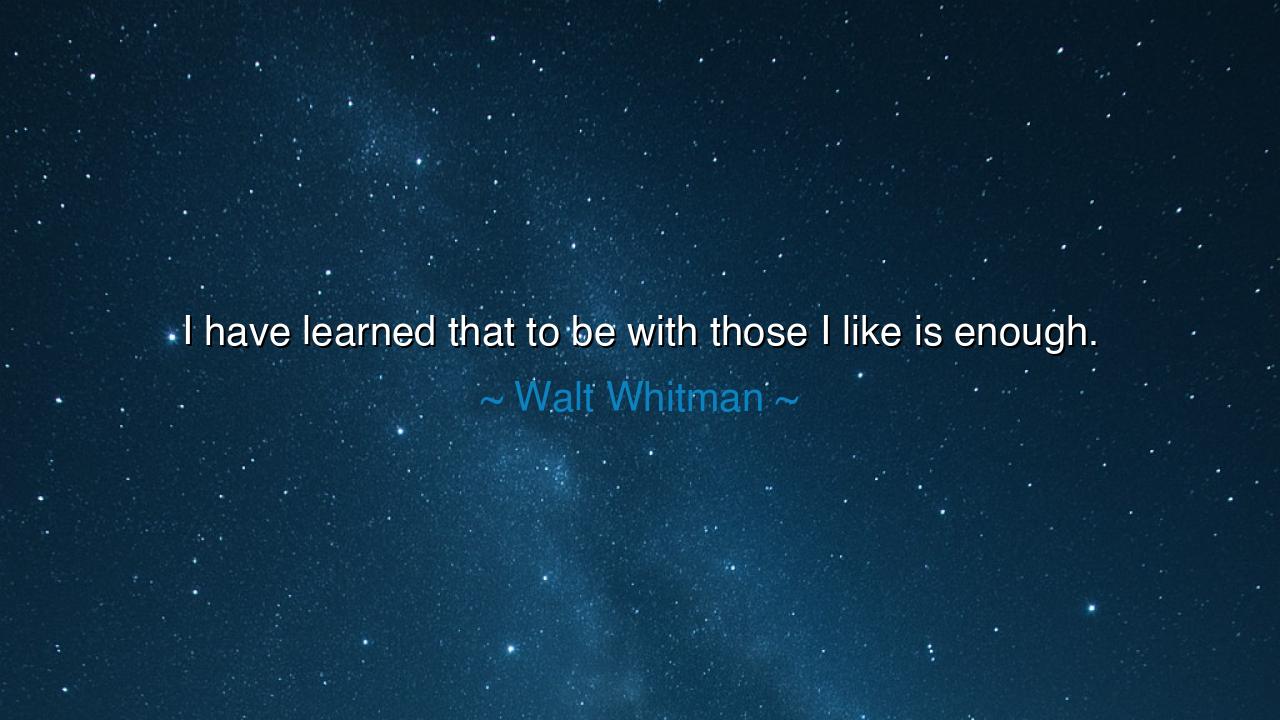
I have learned that to be with those I like is enough.






Walt Whitman, the poet of the soul and celebrant of humanity, once wrote with serene conviction: “I have learned that to be with those I like is enough.” In this simple, radiant sentence lies a wisdom as vast as the open plains of America and as intimate as the beating of one’s own heart. Whitman, who walked among common men and found divinity in their faces, understood that life’s truest wealth is not in possessions or achievements, but in companionship — the quiet, luminous joy of simply being among those we love. To be with those we like, he says, is not a small comfort but a complete fulfillment; for when hearts are in harmony, nothing else is required to make life whole.
The origin of this truth can be found in Whitman’s great work, Leaves of Grass, where he sought to capture the essence of existence in all its forms — the worker’s hand, the lover’s glance, the song of the meadowlark, the fellowship of humanity. Living in an age of change and ambition, he turned not to riches or power for meaning, but to human connection. He walked the streets of his country and saw that what nourished the spirit was not glory or status, but the company of kindred souls. “To be with those I like,” he said, was enough — for what more can one ask than the warmth of presence, the comfort of belonging, and the peace of understanding?
In these words, Whitman invites us to rediscover what the hurried world forgets — that joy is found not in abundance, but in simplicity. We spend our days striving for more: more wealth, more success, more recognition. Yet when evening falls, and the noise of ambition fades, what the heart truly longs for is closeness — a friend’s laughter, a shared silence, a face that feels like home. To Whitman, the human spirit is not nourished by achievements, but by affection. He teaches that to sit among those we cherish — to break bread together, to talk, to walk, to simply exist in each other’s company — is life’s highest form of wealth.
History, too, bears witness to this truth. Consider the story of Helen Keller and her teacher and companion, Anne Sullivan. For Helen, who was both blind and deaf, the world was once a prison of silence and darkness. But through Anne’s love and persistence, she discovered not only language but connection. Together, they transformed isolation into communion. For them, being “with those I like” was not a casual pleasure but salvation itself. Their bond — tested by hardship, sustained by affection — proved that human presence alone can bring light where all else fails. Helen’s life became a living echo of Whitman’s insight: that to be in the company of love and understanding is to possess all that one needs.
Whitman’s words also carry the power of contentment, a virtue rare and sacred. To say “it is enough” is to lay down the endless hunger of desire and rest in gratitude. It is to understand that the heart’s deepest peace comes not from what we own, but from whom we share it with. In his time, Whitman lived modestly — a man of few possessions, yet infinite richness of soul. He saw that in the laughter of friends, in the gentle rhythm of voices joined in companionship, there exists a quiet eternity. Such moments, fleeting though they seem, are the very fabric of meaning — for when we are with those we love, the present becomes eternal.
And yet, Whitman’s wisdom is not sentimental, but profoundly human. To be “with those I like” does not mean to flee the world, but to find within it the sacred spaces of connection that give it value. The world may be filled with sorrow, with injustice and struggle, but even in its darkest hour, the company of a friend can turn the night to dawn. This is the power of fellowship — to make the unbearable bearable, to remind us that we are never truly alone.
So, my children of reflection, learn from Whitman’s quiet truth: seek not the vastness of fame, but the nearness of hearts. Treasure the people whose presence soothes your spirit, and give them your time, for that is the purest gift. Do not rush to fill your life with noise and striving — instead, fill it with faces that bring you peace. Let your evenings be spent not before the glare of ambition, but in the gentle light of friendship and affection. When you find those whose company renews your soul, cherish them, for you have found what countless others chase in vain.
For in the end, as Whitman reminds us, to be with those we like is enough. It is the quiet feast of the heart, the song beneath the noise of the world, the still center of life itself. No palace or crown can offer more than the comfort of belonging. And when the days grow short and the years fall behind us, it will not be the trophies or treasures we remember, but the hands we held, the voices that answered ours, and the laughter shared among friends beneath the fading light of day. In that, and in that alone, the soul finds its rest — and says, as Whitman did: this is enough.






AAdministratorAdministrator
Welcome, honored guests. Please leave a comment, we will respond soon